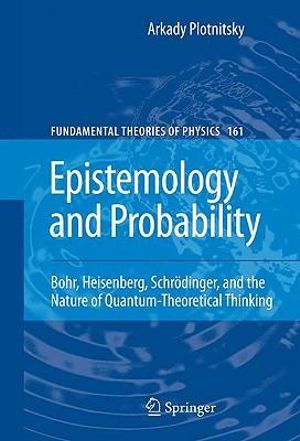
Epistemology and Probability
Bohr, Heisenberg, Schr¶dinger, and the Nature of Quantum-Theoretical Thinking
Hardcover | 5 November 2009
At a Glance
Hardcover
$410.22
Aims to ship in 7 to 10 business days
When will this arrive by?
Enter delivery postcode to estimate
The book offers an exploration of the relationships between epistemology and probability in the work of Niels Bohr, Werner Heisenberg, and Erwin Schrodinger; in quantum mechanics; and in modern physics as a whole. It also considers the implications of these relationships and of quantum theory itself for our understanding of the nature of thinking and knowledge in general. These implications are radical and controversial. While they have been seen as scientifically productive and intellectually liberating to some, Bohr and Heisenberg among them, they have been troublesome to many others, beginning with Schrodinger and, most famously, Einstein, who refused to believe that God would resort to playing dice, as quantum theory appeared to demand. The situation led to an intense debate, in particular the great confrontation between Einstein and Bohr, which began around the time of the discovery of quantum mechanics by Heisenberg and Schrodinger in 1920s and has overshadowed the history of the debate concerning quantum mechanics ever since. The controversy itself surrounding quantum theory and the intensity of the debate concerning it have remained undiminished. No end appears to be in sight.
At the same time, in spite of the enormous and ever proliferating amount of commentaries in all genres (technical, philosophical, and popular), some of the deeper philosophical aspects of quantum mechanics and of the philosophical thought of the figures considered in this study often remain explored. The main aim of this book is to contribute to a better understanding of the nature of quantum-theoretical thinking and of the reasons for this extraordinary impact and controversy. Philosophically, the book pursues this task by bringing together in a new way the relationships between epistemology and probability in quantum theory and beyond. Historically, it does so by engaging comprehensively and in a mutually illuminating way with the work of all three key figures responsible for the birth of quantum mechanics - Heisenberg, Schrodinger, and, as concerns quantum epistemology, Bohr - which has not be previously done in literature on quantum mechanics. Among other key contributions of the book is an analysis of the role of mathematics in quantum theory and in the thinking of Bohr, Heisenberg, and Schrodinger; a new treatment of the famous experiment of Einstein, Podolsky, and Rosen (EPR) and of the Bohr-Einstein exchange concerning it; and an exploration of the implications of the epistemological problematics considered by the book for new developments of quantum mechanics itself, such as quantum information theory, on the one hand, and, on the other, for higher-level physical theories, from quantum field theory to string/brane theories and new cosmological theories.
Industry Reviews
From the reviews:
"Plotnitsky (theory and cultural studies, Purdue Univ.) analyzes the discussions and disagreements among the principals (mentioned in the title), and offers his insightful comments on the questions. ... The discussions on probability and epistemology remind readers of 18th-century debates on the topic in which d'Alembert participated. This book should interest anyone seeking a deeper understanding of the epistemology of quantum mechanics, especially the issues thrashed out in the early phases. ... Summing Up: Highly recommended. Academic libraries serving graduate students, researchers, and faculty." (V. V. Raman, Choice, Vol. 47 (10), June, 2010)
"This is an exposition of what the author calls 'non-classical epistemology' in close relationship with the emergence and development of quantum mechanics. ... Plotnitsky unfolds a nuanced presentation of the so-called 'Copenhagen spirit' or, more precisely, of the ideas of his central hero, Niels Bohr, taken to their logical conclusion. ... Plotnitsky's narrative makes fascinating reading, and not only for those who are sympathetic to his views. ... the book represents a challenge and motivation for the opponents of such views, particularly scientific realists." (Vassilis Sakellariou, Metascience, Vol. 21, 2012)
ISBN: 9780387853338
ISBN-10: 0387853332
Series: Fundamental Theories of Physics
Published: 5th November 2009
Format: Hardcover
Language: English
Number of Pages: 438
Audience: Professional and Scholarly
Publisher: Springer Nature B.V.
Country of Publication: US
Dimensions (cm): 23.39 x 15.6 x 2.87
Weight (kg): 0.85
Shipping
| Standard Shipping | Express Shipping | |
|---|---|---|
| Metro postcodes: | $9.99 | $14.95 |
| Regional postcodes: | $9.99 | $14.95 |
| Rural postcodes: | $9.99 | $14.95 |
How to return your order
At Booktopia, we offer hassle-free returns in accordance with our returns policy. If you wish to return an item, please get in touch with Booktopia Customer Care.
Additional postage charges may be applicable.
Defective items
If there is a problem with any of the items received for your order then the Booktopia Customer Care team is ready to assist you.
For more info please visit our Help Centre.
You Can Find This Book In
This product is categorised by
- Non-FictionLanguage & LinguisticsLinguisticsSemantics & Discourse Analysis
- Non-FictionPhilosophyEpistemology & The Theory of Knowledge
- Non-FictionSciencePhysicsQuantum Physics & Quantum Mechanics & Quantum Field Theory
- Non-FictionScienceScience in GeneralPhilosophy of Science
- Non-FictionMathematicsProbability & Statistics
- Non-FictionSciencePhysicsNuclear Physics

























